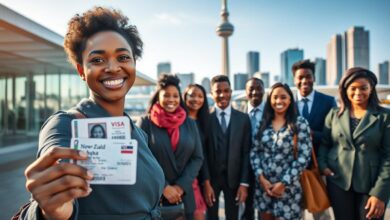UK Visa Sponsorship: Opening Doors for Nigerian Job Seekers
Visa sponsorship in the UK is crucial for Nigerians wanting to work and live there. It’s about employers sponsoring visas for skilled workers. This path can lead to better jobs, higher pay, and connections worldwide.
This article explains visa sponsorship, the types of UK job opportunities, and how to apply. It covers in-demand fields, companies hiring abroad, and UK’s visa rules. It’s for Nigerian job seekers, graduates, and professionals, as well as UK recruiters looking for Nigerian talent.
It gives realistic application timelines, relocation advice, and sources for strong applications. It aims to help candidates succeed in their UK job search.
Understanding Visa Sponsorship in the UK
Visa sponsorship in the UK lets employers hire people from outside the country. They need a sponsor licence and a Certificate of Sponsorship. This link between the migrant and the employer has clear rules for both sides. For Nigerians, knowing what employers and applicants need is key.
Definition and Importance of Visa Sponsorship
Visa sponsorship means a UK employer takes on legal duties for a foreign worker. They must follow UKVI rules on keeping records and checking work rights. A valid Certificate of Sponsorship shows the job meets skill and salary standards.
Sponsored jobs offer access to skilled roles and can lead to settling in the UK. Employers that follow the rules help candidates apply for Visa Sponsorship UK, like the Skilled Worker visa.
Types of Work Visas Available
- Skilled Worker visa: Replaced Tier 2 General. Requires a Certificate of Sponsorship, an approved occupation code, and salary meeting the threshold tied to RQF skill levels.
- Global Talent visa: For exceptional individuals in science, humanities, engineering, the arts, and technology. This route often needs endorsement rather than employer sponsorship.
- Health and Care Worker visa: Designed for medical roles with streamlined requirements and possible salary concessions for eligible NHS jobs.
- Intra‑company Transfer visa: For staff moved within a multinational firm. Conditions depend on length of transfer and role seniority.
Other routes, like the Ancestry visa or Youth Mobility Scheme, don’t need employer sponsorship. But they have limited eligibility and don’t usually apply to Nigerians. Knowing which path is right helps manage expectations in the work permit process UK.
Eligibility Criteria for Visa Sponsorship
Employers need a valid sponsor licence and must follow HR rules. They must also keep accurate records for sponsored staff. UKVI checks sponsors and can take away their licence if they don’t follow the rules.
Applicants need a valid Certificate of Sponsorship and meet salary and skill standards. They also need to show they can speak English well enough. For the Skilled Worker visa, the usual English level is CEFR B1 unless an exemption applies. They might need to show they have enough money unless the employer says they don’t need to.
Before applying, some checks might be needed, like criminal record checks and a tuberculosis test for some countries. Meeting both employer and applicant rules helps keep the Visa Sponsorship UK and employer-backed visas UK process smooth and avoids delays.
The Process of Securing a Visa Sponsorship
Getting a UK job from Nigeria needs clear steps and the right paperwork. This part explains how to go from job search to visa approval. It also talks about common problems and how to solve them. You’ll get a simple guide on applying for a Job sponsorship application UK and the Work permit process UK.
Step-by-Step Guide to Applying
First, look for licensed sponsors on GOV.UK, LinkedIn, Indeed, or NHS Jobs. Find jobs that offer a Certificate of Sponsorship. Choose employers on the licensed sponsor list for better chances.
After getting a job offer, make sure your employer will give you a Certificate of Sponsorship. Use the CoS reference to apply online at the UK Visas and Immigration portal. Pay fees and the Immigration Health Surcharge, then book biometrics at the British High Commission or a visa application centre in Nigeria.
Expect different times for each step. Employer recruitment and CoS issuance can take weeks. Visa processing can take a few weeks to several months, depending on the service. Keep track of your progress with a checklist.
Required Documentation and Evidence
You’ll need a valid passport, the Certificate of Sponsorship reference number, and proof of English. This can be IELTS for UKVI or an accepted exemption. You might also need bank statements, unless your employer certifies maintenance on the CoS.
Other documents could include a tuberculosis test certificate, a criminal record certificate for certain roles, and your academic and professional credentials. You might also need proof of professional registration, like the Nursing and Midwifery Council for nurses. Make sure job title, salary, and employer details match the CoS exactly to avoid delays.
Common Challenges and Solutions
Some employers won’t sponsor international hires. To overcome this, focus on firms listed as licensed sponsors. Work with specialist recruiters who place international candidates. This boosts your chances of getting a Job sponsorship application UK.
Salary thresholds can also be a barrier. Look for roles in IT, engineering, or healthcare where salaries meet or exceed the required levels. Check the shortage occupation list for roles with lower thresholds when applying for Visa Sponsorship UK.
Document gaps and timing issues are common problems. Gather documents early and use verified translators for non-English records. Ask employers to certify maintenance or expedite the CoS. These steps help smooth the Work permit process UK and avoid costly delays.
Popular Sectors Seeking Nigerian Talent
The UK job market is booming in many areas where Nigerian professionals can shine. In cities like London, Manchester, and Cambridge, employers seek specific skills and experience. These roles are often on sponsor lists, helping to fill the skilled worker gap.
Information Technology and Software Development
Jobs in software engineering, DevOps, cloud computing, data science, and cybersecurity are in high demand. Companies like Revolut and Monzo, as well as big consultancies and startups, are looking for engineers from abroad.
They want people with Java, Python, and JavaScript skills. Cloud certifications from AWS or Azure and experience in agile teams are also key. Having these qualifications can help you get sponsored and find a job quickly.
Healthcare and Nursing Professions
NHS trusts and private health providers are urgently hiring nurses, doctors, and other healthcare workers. The Health and Care Worker visa offers lower fees and might waive the Immigration Health Surcharge for some.
It’s crucial to have recognition from the Nursing and Midwifery Council or the General Medical Council. There’s a big need in critical care, mental health, and community nursing. This creates lasting job opportunities for Nigerian professionals in the UK.
Engineering and Technical Roles
Civil, mechanical, and electrical engineers, along with skilled tradespeople, are needed for projects in construction, energy, and manufacturing. Companies like Balfour Beatty, BP, and Siemens sometimes sponsor international hires for these roles.
Having a UK-recognized engineering degree and being registered with the Engineering Council is important. Proven project experience also makes you stand out. These qualifications meet employer needs and help address the skilled worker shortage in the UK.
Benefits of Securing a UK Visa Sponsorship
Getting a visa sponsorship is a big step for Nigerian professionals wanting to work in Britain. It opens doors to top employers, clear career paths, and a support system. These advantages help plan for the future and make moving to Britain easier.
Career Growth Opportunities
Working for big companies like Barclays, GlaxoSmithKline, Tesco, or NHS trusts can speed up your career. They often pay for training and offer chances to become chartered or registered with the Nursing and Midwifery Council.
Meeting people from different backgrounds helps build your international network. This mix of training, certifications, and exposure boosts your career prospects across Britain.
Financial Advantages
Salaries in the UK are often higher than in Nigeria for similar jobs, especially in finance, tech, and healthcare. You also get benefits like pension contributions, paid leave, and sick pay.
It’s easier to send money back home to your family. But remember, the cost of living in cities like London, Birmingham, and Manchester is high. You’ll also have to consider UK taxes.
Cultural and Social Integration
Big cities offer a mix of cultures where you can easily access public services like the NHS and good transport. There are also Nigerian communities in London, Birmingham, and Manchester for support.
Groups, churches, and diaspora organizations help with finding a place to live, schools, and getting used to the area. They make settling in Britain easier and help you integrate faster.
Impact of Brexit on Visa Sponsorship
After Brexit, hiring foreign workers changed. The UK now uses a points-based system for immigration. This system looks at skills, language, and who sponsors the worker.
The old EU routes are gone. Now, many worker paths are under one umbrella, like the Skilled Worker visa. This makes rules clearer for everyone. Companies like NHS Trusts and tech firms need to sponsor workers under these new rules.
Changes in Immigration Policies
New policies focus on skills and salaries. The Skilled Worker visa has a clear salary requirement. Employers must have a sponsor licence to hire from abroad.
Rules for qualifications, English, and job level are being updated. The Migration Advisory Committee helps decide which jobs get special treatment.
Opportunities for Non-EU Nationals
Now, Non-EU applicants face the same rules as EU ones. This makes it fairer for everyone, including Nigerians. If they meet the skills and salary criteria, they can apply.
There’s a big need for workers in healthcare, engineering, and IT. The Shortage Occupation List helps by lowering salary needs for certain jobs. This makes it easier for Non-EU workers to find jobs.
Future Outlook for Visa Sponsorship
Policy makers are still making changes. They want to fix the Skilled worker shortage UK and meet other needs. They might change salary rules, visa fees, or focus on certain areas like health and tech.
It’s important to keep up with news from the Home Office and Migration Advisory Committee. This way, job seekers and employers can adjust to new visa rules and find more opportunities for Non-EU Nationals.
Key UK Employers Offering Visa Sponsorship
Many Nigerian professionals want to know which companies offer visa sponsorship in the UK. This section will highlight top firms and ways to find jobs with sponsorship.
Big companies, both public and private, often hire international talent. The National Health Service and major banks like HSBC and Barclays have programs for visa sponsorship.
The tech sector has many job options. Companies like Amazon UK and Google UK, along with tech startups, offer sponsorship for certain roles.
Engineering and construction firms need skilled workers. Companies like Siemens and Balfour Beatty sponsor visas for these roles.
Before applying, check if a company sponsors visas. The GOV.UK register lists companies that sponsor visas. It helps confirm if a role is eligible for sponsorship.
Industry-specific hiring highlights
- Healthcare: NHS trusts, private hospitals, and recruiters like HCL Workforce Solutions often hire nurses and health staff with sponsorship.
- Technology and finance: Global tech companies, investment banks, and software consultancies sponsor engineers, data scientists, and developers.
- Engineering and construction: Firms in infrastructure, energy, and manufacturing hire project engineers, site managers, and technical specialists with sponsorship.
Networking and outreach
Networking can help find jobs with sponsorship. Professional groups like the British Computer Society and EngineeringUK host events to connect candidates with employers.
Alumni networks and groups like the Nigerians in Diaspora Organisation UK can help find local contacts. LinkedIn is great for following companies, engaging with recruiters, and finding referrals for sponsorship.
Going to industry events, joining professional groups, and reaching out to sponsored employees can lead to job opportunities. It can also speed up the visa sponsorship process.
Preparing for Life in the UK
Moving from Nigeria to Britain requires planning and understanding cultural changes. This guide helps with key tasks, workplace norms, and useful contacts. It aims to make your transition smoother.
Tips for Relocation and Settling In
Begin with a checklist to avoid missing important steps. Find a place to live, register with a doctor, get a National Insurance number, open a bank account, and set up a mobile plan and transport card.
Choose whether to ship your belongings or buy new ones. Shipping can be expensive and slow. Buying essentials when you arrive can save time and reduce stress.
Read your tenancy agreement carefully. Consider short-term housing like serviced apartments while you look for a long-term place to live.
Understanding UK Work Culture
In Britain, being on time and clear in communication is key. Arriving on schedule and responding promptly to emails is important.
Workplaces value teamwork and follow formal HR rules. Learn about leave policies and flexible working early on.
Equality and diversity laws protect workers. It’s important for newcomers to know their rights and what’s expected in the workplace to avoid confusion.
Resources for Nigerian Expats
- The British Council offers cultural and educational advice for newcomers.
- The Nigerian High Commission in London provides consular services and registration help.
- Citizens Advice helps with housing, benefits, and consumer rights.
- The NHS explains how to register with a GP and use health services in the UK.
- Community organisations and diaspora groups on Facebook and WhatsApp share local tips and job leads.
When preparing to work in the UK, use local portals and community networks for advice. These resources for Nigerian expats help you settle in faster and feel less isolated.
Legal Considerations and Compliance
The legal rules for sponsored work in the UK can seem complicated. It’s important to understand the main rules for sponsored jobs. Knowing where to get help when you have questions is also key.
Immigration frameworks and employer duties
The Immigration Rules and the Points-Based System are key. Employers must follow Home Office duties. This includes keeping accurate records and reporting changes quickly.
Workers should know they can’t switch jobs without a new Certificate of Sponsorship. They must also follow the allowed work types. The right to bring dependants depends on the visa type and income.
When professional advice matters
For complex cases, getting help from experts is a good idea. Solicitors and OISC advisers can help with appeals, refusals, and sponsorship disputes. They can also review contracts and explain professional rules.
Legal advice can also guide you on long-term paths like Indefinite Leave to Remain. It helps plan for meeting residency requirements.
Risks of not following the rules
Not following the rules can have serious consequences for employers and workers. Sponsors might face licence suspension or fines. Workers could see their visas curtailed, removed, or banned from re-entry.
Keeping accurate records and following work conditions can help avoid trouble. Employers should report changes quickly to protect themselves and their staff.
Success Stories: Nigerian Professionals in the UK
Many Nigerian professionals in the UK have followed clear paths to success. Software engineers got Skilled Worker visas to work in London tech firms after completing courses and applying strategically. Nurses joined the NHS through international recruitment, and civil engineers moved to projects in Manchester and Birmingham after getting professional accreditation.
These stories show how important mentorship and focused job searches are. They help visa holders achieve their goals.
Visa holders often face challenges like getting licenses and meeting English language requirements. They also need to find housing. To make the transition easier, they can take bridging courses, use recruitment agencies, and get advice from diaspora networks in Lagos and Abuja.
Nigerian professionals make a big impact in the UK. They fill important gaps in healthcare and tech, drive innovation in finance and software, and contribute to the economy through taxes. They also get involved in community activities, start businesses, and organize cultural events. These efforts strengthen social ties and show the benefits of visa sponsorship for both employers and migrants.
FAQ
What is visa sponsorship and how does it help Nigerian job seekers move to the UK?
Visa sponsorship lets a UK employer help a non-UK national get a work visa. This is called the Skilled Worker visa. It opens doors to skilled jobs and a clear path to settling in the UK if you meet the requirements.
Which UK work visas require employer sponsorship?
You need a sponsor for the Skilled Worker visa, Health and Care Worker visa, and Intra-company Transfer visa. But, the Global Talent visa has different rules. Some visas, like Ancestry or Youth Mobility, are not for most Nigerians.
What are the basic eligibility requirements for a Skilled Worker visa?
You need a job offer from a UK employer with a sponsor licence. The job must meet skill and salary standards. You also need to speak English well and have enough money or a sponsor to prove it.
How can a Nigerian job seeker find UK employers who sponsor visas?
Check the GOV.UK register of licensed sponsors. Look for jobs on LinkedIn, Indeed, and sector websites. Target known sponsors and work with recruiters who help international candidates.
What documents are needed for a UK work visa application from Nigeria?
You’ll need a valid passport, a Certificate of Sponsorship, and proof of English. Also, bring your academic and professional certificates, and bank statements if needed. Make sure all details match the CoS.
How long does the visa sponsorship process typically take?
It can take weeks to months to find a sponsored job. Visa processing from Nigeria takes several weeks. Add time for biometrics, professional checks, and document gathering.
What are common barriers Nigerian applicants face and how can they be overcome?
Employers might not sponsor, or you might not meet salary or skill needs. To overcome this, target firms on the GOV.UK list, look for in-demand sectors, and prepare your documents early. Use verified translators or recruiters for help.
Which sectors most frequently sponsor Nigerian professionals?
IT, healthcare, and engineering are in high demand. Employers like NHS trusts, Amazon UK, Google UK, and Siemens often sponsor. These roles offer good opportunities for Nigerian professionals.
Does Brexit affect chances for Nigerian nationals to gain UK sponsorship?
Brexit changed immigration rules, making it easier for non-EU nationals like Nigerians to get work visas. It also made it harder for employers to sponsor workers, but there are still opportunities in certain fields.
Can a sponsored worker bring family members to the UK?
Yes, many visas allow dependants if you meet income and visa requirements. Family members must apply separately and may need to pay the Immigration Health Surcharge. Check the Home Office for specific rules.
What are the benefits of securing a UK visa sponsorship for a Nigerian professional?
You get to work for top employers, develop your career, and earn more. You also enjoy better work conditions and can live in multicultural cities. Over time, you might be eligible for permanent residency.
How important is professional registration (e.g., NMC, GMC) for sponsored healthcare workers?
It’s crucial for healthcare roles. Nurses need NMC registration, and doctors need GMC registration. Start these processes early to avoid delays in your visa and relocation plans.
What legal obligations do UK employers have when sponsoring workers?
Employers must keep records, monitor employees, and report changes. They must also have good HR systems. Failure to comply can lead to penalties. Sponsored workers must report any changes that affect their visa.
When should a Nigerian applicant seek legal or immigration advice?
Get legal advice for complex cases like visa refusals or appeals. Use OISC-regulated advisers or qualified immigration solicitors to ensure you follow the law and navigate complex rules.
What practical steps should new arrivals take after arriving in the UK on a sponsored visa?
Register with a GP, apply for a National Insurance Number, and open a UK bank account. Arrange accommodation and set up a mobile phone and transport card. Also, register with your employer’s HR and connect with local Nigerian groups.
Where can Nigerian job seekers find authoritative, up-to-date information on sponsorship and visas?
Check GOV.UK, official Home Office guidance, and the GOV.UK register of licensed sponsors. For specific rules, visit regulators like the NMC or GMC. For legal advice, consult OISC-regulated advisers or qualified immigration solicitors. Community organisations and professional bodies offer practical insights.





